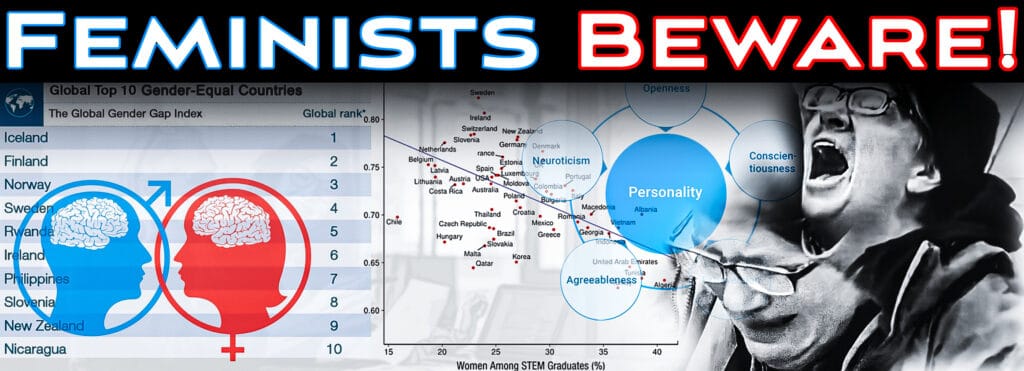
DEBUNKING THE GENDER WAGE GAP
Feminists beware! Debunking the wage gap once and for all, with EVIDENCE!
04 April 2021 – | By Richard Ahern – Does the wage gap exist because of gender?
FACT-CHECK GUARANTEE (References): [Peer-reviewed research paper: 1 source] [Academic journal: 1 source] [Official statistics: 2 sources] [Medical authority: 1 source] [High-authority and trusted website: 2 sources]
NO!
The gender wage gap does not exist: because any wage gap between men and women is not because of gender!
Women paid less than men on average are not paid less because they are women, they are paid less due to a range of factors such as personality differences, job type, and time spent in work, which we will prove in this article.
Some gender wage gap statistics may show that women earn less than men on average, but these gender pay gap statistics are often misinterpreted by feminists and the political left.
Despite the left’s best efforts to refute reality, let me state a fact:
Men and women are different. The important question to ask is why do women get paid less than men some of the time?
There are many biological and psychological differences between males and females. The biological differences between men and women are profound. Biologically, men and women have different hormonal profiles, men have more testosterone which can affect brain chemistry and personality.
Our brains are different on a biological level, you may have heard of the male and female brain.
Here’s the deal:
There is a proven difference between male and female brains. The male brain is around 10% bigger than the female brain (men are physically bigger), but it does not affect intelligence.
There are no intelligence differences between men and women.
The inferior-parietal lobule tends to be larger in males, this part of the brain is linked to solving mathematical problems, which may be why men tend to enter STEM fields (science, technology, engineering, and mathematics) more than women.
But more about that later…
There is evidence that women have more gray matter than men. Gray matter helps our brain process information from the body and is present in brain regions involved in muscle control and sensory perception.
Although women have more gray matter than men, they tend to use more white matter, which connects processing centers in the brain. Whereas men tend to make more use of their gray matter despite having less of it on average!
Got it!?
Table of contents (jump to):
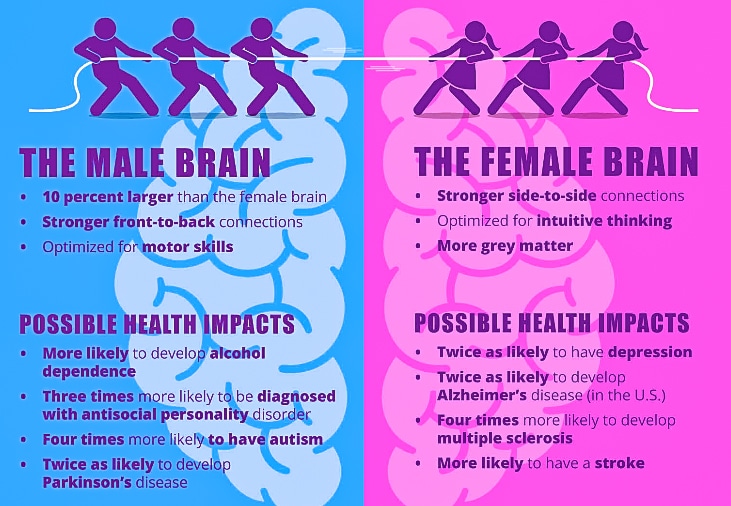
BIOLOGICAL DIFFERENCES BETWEEN MALES AND FEMALES
- Men have a 10% bigger brain but are not more intelligent.
- Women have more gray matter than men but use more white matter.
- Men use more of their gray matter than women despite having less of it.
- Men have a bigger inferior-parietal lobule.
THE FIVE FACTOR MODEL OF PERSONALITY
Let’s get straight to the point:
Men and women have structurally different brains, but they also use their brains differently! This may be why men tend to excel with task-orientated projects, but women are better at language processing and multitasking.
Needless to say, men and women have different brains on a biological level which would explain the differences in psychology and personality, which we’ll discuss now.
On the psychological front, we are not talking about intelligence or IQ; studies have shown that men and women score equally on IQ and intelligence metrics. Men are not more intelligent than women, or vice versa.
I’m not saying that at all!
There is no difference between men and women when it comes to cognitive ability, the data is clear on that. Where men and women do differ is on personality traits.
Psychologists use the Big Five Model to understand personality which identifies 5 distinct personality metrics.
These are:
1) Agreeableness — Agreeable people are generally trusting, generous, kind, considerate, and very willing to compromise even if it conflicts with their own interests. Agreeable people are often empathetic and have an optimistic view of human nature. Disagreeable people are more selfish, suspicious, unfriendly, uncooperative, and argumentative. Disagreeable people have less concern for other people’s feelings and emotions.
2) Openness — Openness to experience is defined as having an appreciation for adventure, imagination, curiosity, and unusual ideas. Open people tend to be more creative and aware of their feelings. However, open individuals are more likely to suffer from addiction problems and engage in more risky behaviors. Unopen people have difficulty understanding abstract ideas and have poor imaginations.
3) Conscientiousness — Conscientious people are extremely hard-working, self-disciplined, and strive for achievement. They are often stubborn and extremely focused on achieving a particular goal. Conscientious people like order, follow a schedule, pay attention to detail, and are always prepared. Unconscientious people are disorganized, impulsive, and lazy. Conscientiousness correlates strongly to success, people who score high on conscientiousness are often extremely successful in their careers.
4) Extraversion — Extraverted people love to engage with the outside world. They love interacting with people and come across as extremely high energy in social situations. They appear more dominant in a group, love to talk, and assert themselves regularly. Introverts are the opposite, who will come across as very shy and uncomfortable in social situations and prefer to spend time inside and alone.
5) Neuroticism — Neuroticism is a tendency to experience negative emotions, such as anxiety, anger, and depression. Neurotic people have a low tolerance for stress, let minor difficulties upset them, and are generally perceived as negative or pessimistic. People who score low on neuroticism have a stable mood and come across as relaxed most of the time.
So, do men and women score differently on the Big Five personality test?
Yes! The data is in and there is clear evidence of personality differences between women and men. Among college and adult samples with the Five-Factor Model of personality, women score higher than men for agreeableness and neuroticism.
Women are more agreeable and neurotic than men.
On the Big Five personality test with openness and extroversion, men and women show very little difference when sampled over a large population.
Men and women also score similarly on conscientiousness on the Big Five test, however over a large sample, men appear slightly more industrious, and women are slightly more orderly. The differences are negligible with conscientiousness though.
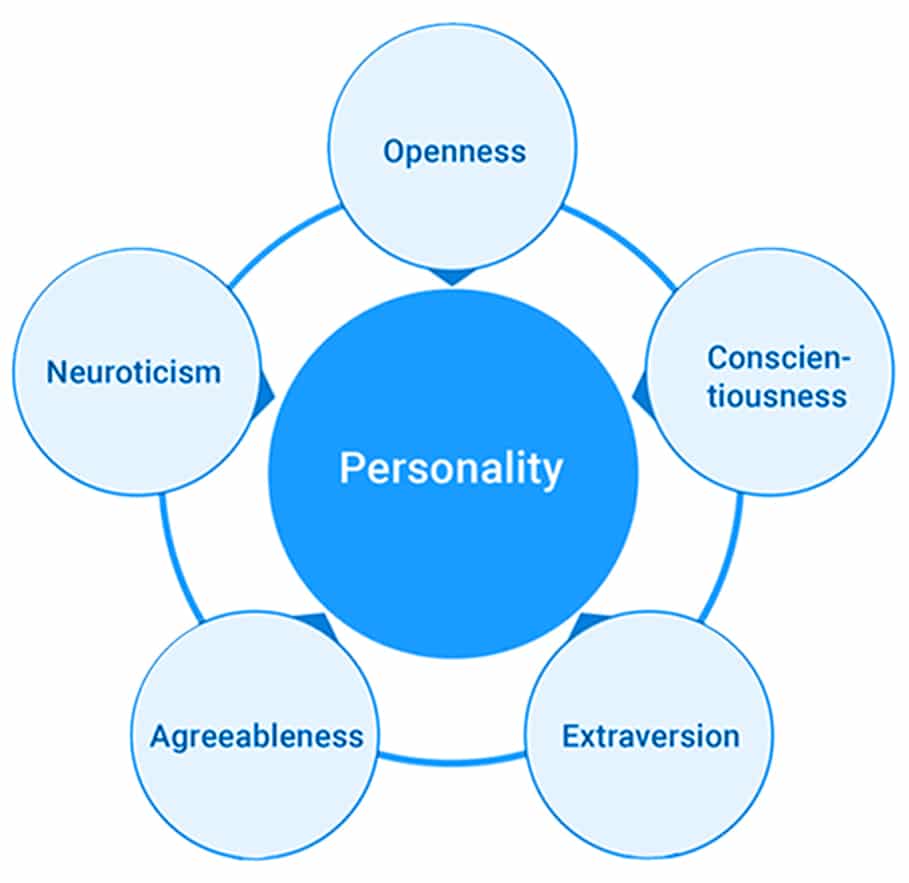
PSYCHOLOGICAL DIFFERENCES BETWEEN MALES AND FEMALES
- Men and women score equally on IQ and intelligence tests.
- Women are more agreeable than men.
- Women are more neurotic than men.
- Men and women score the same on openness and extroversion.
- Men and women score similarly on conscientiousness.
- Men are slightly more industrious than women.
- Women are slightly more orderly than men.
AGREEABLENESS PERSONALITY TRAIT
This personality trait data is taken over a huge sample of people and we’re talking about on average.
So, if you picked a random woman and a random man from a large group, most likely, the woman would be more agreeable and neurotic than the man.
That’s not to say there are no disagreeable women out there, of course, there are, and there’s plenty of agreeable men! There are outliers on all ends of the spectrum, and we’re not diminishing individual differences here, we’re talking about statistics and probabilities with psychological differences between men and women.
So, what do we know so far?
We know from research that women are more agreeable and neurotic than men. Agreeable people tend to earn less than disagreeable people.
Why?
For a start, agreeable people don’t like conflict and are less assertive in pursuing their own selfish needs.
Here’s an example:
Who is more likely to ask their boss for a promotion?
The disagreeable individual.
An agreeable person would be less likely to ask for a promotion as they would fear it would involve conflict. They more likely value getting along with their boss than risking a conflict for a pay rise.
- Agreeable people earn less than disagreeable people.
- Women are more agreeable than men.
- Women get paid less on average because they are more agreeable. Fact.
THE GENDER GAP INDEX
Personality traits such as agreeableness are often why women pursue different jobs than men. Agreeable people are more caring, so are more likely to pick professions such as nursing and childcare, which are careers that may pay less than careers disagreeable people choose.
A disagreeable person is more likely to choose a career such as a lawyer, considering they thrive in argumentative environments. Lawyers get paid more nurses, whether that should be the case is debatable of course.
On average, taken from a large sample, agreeable individuals prefer working with people. Disagreeable people are more interested in things and working alone. That’s why men are more likely to go into STEM fields (science, technology, engineering, and mathematics). STEM fields pay more in the current job climate as they are in high demand.
Women are more neurotic than men, statistically on average. Women are more likely to have a lower tolerance for stress and be more susceptible to mental health problems caused by stress. Higher-paying jobs can often come with more stress than lower-paying jobs.
Men may choose more stressful careers, but highly neurotic women may shy away from them. Plenty of women can handle stress and work in stressful careers though (I can hear the feminists about to explode). We’re generalizing here, but it is statistically significant, nevertheless.
I hear you saying:
Women aren’t encouraged to work in STEM fields because of gender biases in society!
Well, let’s look at the most egalitarian societies on Earth, where they have taken gender equality to the max. Norway, Sweden, Finland, and Iceland all consistently rank as the world’s most gender-equal countries, according to the World Economic Forum. They have tried to achieve equality of outcome.
Here’s the kicker:
In countries with higher gender equality, women are less likely to get STEM degrees. When a country tries to equalize gender differences to achieve so-called equality, the differences between men and women are exaggerated! More men enter STEM fields, and more women enter careers in nursing, childcare, and teaching.
The most egalitarian countries such as Finland and Norway have the lowest percentage of women that are STEM graduates.
Furthermore, conservative countries such as Turkey, United Arab Emirates, and Algeria have the highest percentage of women that are STEM graduates!
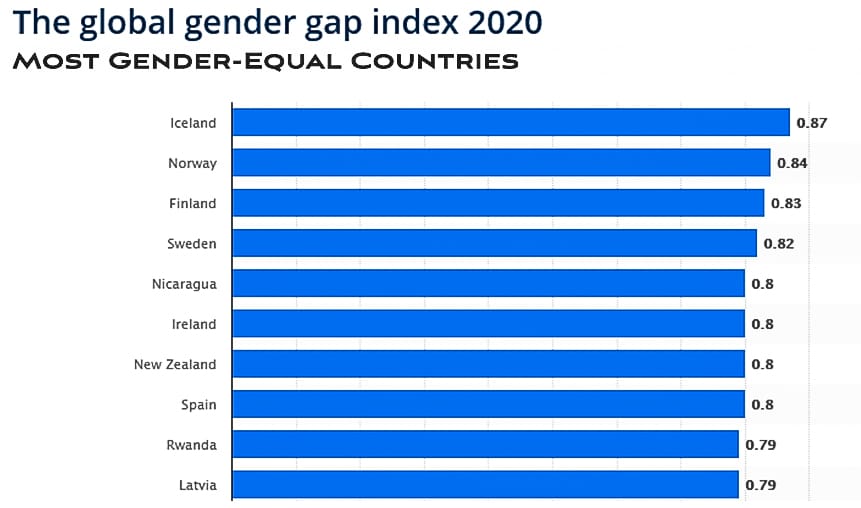
GENDER DISPARITY IN STEM
- Less women enter STEM fields in egalitarian (gender-equal) countries.
- More women enter STEM fields in less egalitarian countries.
- The career choices of men and women are not due to societal factors.
You can’t socially engineer out gender differences, more social engineering results in more gender disparity.
Men and women are different; most sensible people have known this since the dawn of human history.
It’s common sense…
The research has proven it, but it’s common sense to most people that women are more agreeable than men and have different career interests, which is what causes the wage disparity.
A woman doing the same job (with the same qualifications and experience) as a man in countries such as the United States and the United Kingdom will get paid the same, providing they work the same hours (maternity leave is a factor).
It is illegal for an employer to do otherwise.
Men may pick higher-earning careers, push more aggressively for promotion, and work longer hours over a lifetime. On average and at face value, men may earn more according to some statistics, but it’s not due to gender, it’s due to personality differences.
There’s plenty of women who do enter STEM fields, and there isn’t anything stopping them.
We all strive for equal opportunity, and in most western countries in 2021, we have it!
It’s advisable for a woman looking to advance her career to be less agreeable and push for that promotion, nothing is stopping them!
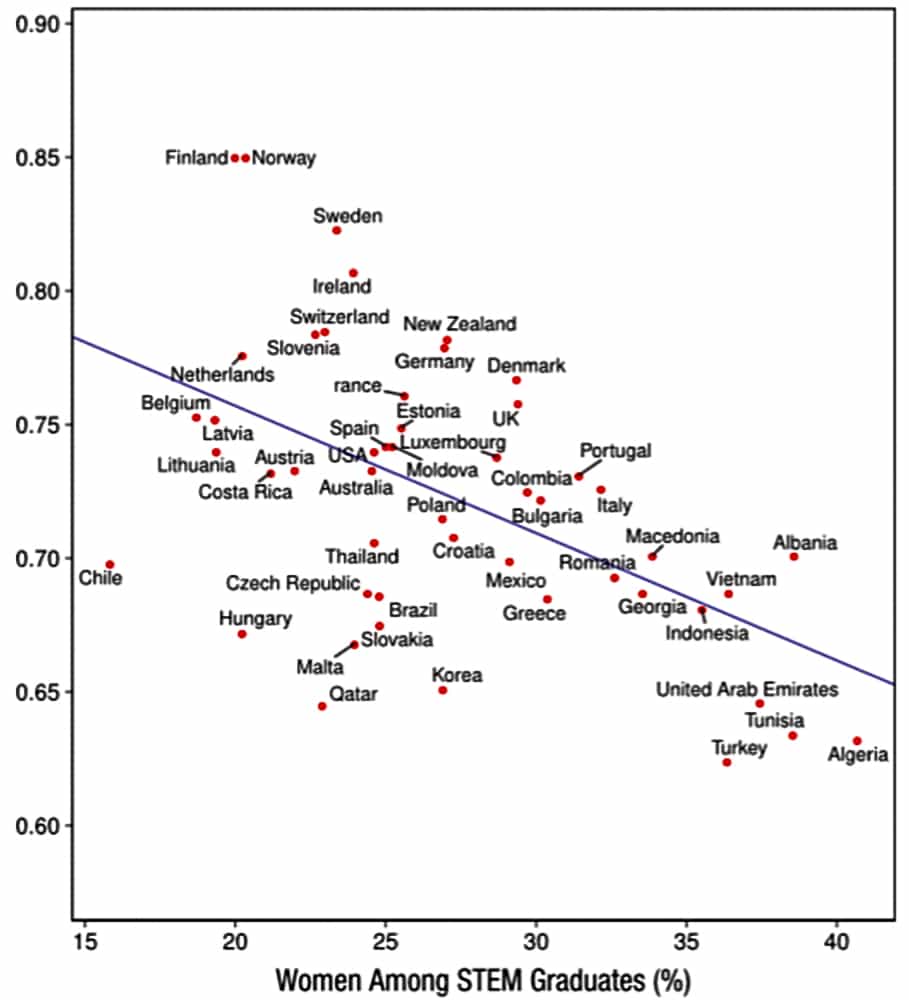
GENDER PAY GAP DEBUNKED
- The wage gap is not due to gender.
- Biological and personality differences are what make men and women choose different careers.
- Social engineering does not work, gender is a biological not a social construct.
We’ve covered a lot in this article, from the biological and psychological differences between genders to how social engineering makes no difference to what careers men and women pick.
The evidence is there, the data is in, and you can’t argue with it.
The wage gap debunked!
We need YOUR help! We bring you the uncensored news for FREE, but we can only do this thanks to the support of loyal readers just like YOU! If you believe in free speech and enjoy real news, please consider supporting our mission by becoming a patron or by making a one-off donation here. 20% of ALL funds are donated to veterans!
What's YOUR Reaction?
AUTHOR BIO

Richard Ahern
CEO of LifeLine Media
Richard Ahern is a CEO, entrepreneur, investor, and political commentator. He has a wealth of experience in business, having founded multiple companies, and regularly does consulting work for global brands. He has a deep knowledge of economics, having spent many years studying the subject and investing in the world’s markets.
You can usually find Richard with his head buried deep inside a book, reading about one of his plethora of interests, including politics, psychology, writing, meditation, and computer science; in other words, he’s a nerd.
Email: Richard@lifeline.news
Instagram: @Richard.Ahern
Twitter: @RichardJAhern
By Richard Ahern – LifeLine Media
Contact: Richard@lifeline.news
Published: 04 April 2021
Last Updated: 20 November 2021
References (Fact-check guarantee):
- Battle of the Brain: Men Vs. Women: https://www.nm.org/healthbeat/healthy-tips/battle-of-the-brain-men-vs-women-infographic [Medical authority]
- Big Five personality traits: https://en.wikipedia.org/wiki/Big_Five_personality_traits [High-authority and trusted website]
- The Big Five Personality Traits: https://www.simplypsychology.org/big-five-personality.html [High-authority and trusted website]
- Gender Differences in Five Factor Model Personality Traits in an Elderly Cohort: Extension of Robust and Surprising Findings to an Older Generation: https://www.ncbi.nlm.nih.gov/pmc/articles/PMC2031866/ [Peer-reviewed research paper]
- Personality and pay: do gender gaps in confidence explain gender gaps in wages?: https://academic.oup.com/oep/article/70/4/919/5046671 [Academic journal]
- Here are the top 10 countries in the world for gender equality: https://www.businessinsider.com/top-10-world-gender-equality-world-economic-forum-2019-12?r=US&IR=T [Official statistic]
- In countries with higher gender equality, women are less likely to get STEM degrees: https://www.weforum.org/agenda/2018/02/does-gender-equality-result-in-fewer-female-stem-grad [Official statistic]
Politics
The latest uncensored news and conservative opinions in US, UK, and global politics.
get the latestLaw
In-depth legal analysis of the latest trials and crime stories from around the world.
get the latest
Join the movement on social media...
Join the discussion!
For more discussion, join our exclusive forum here!










Join the discussion!
Be the FIRST to comment on ‘Why the Gender Wage Gap DOESN’T Exist (With EVIDENCE)!’